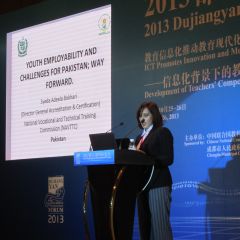As the global community gears up for the Sustainable Development Agenda, a key priority is to ensure that the youth is equipped for the increasingly dynamic labour markets and enabled to pursue lifelong learning.
In the wake of technological, environmental and demographic shifts, the challenge of creating jobs and livelihood opportunities is enormous. However, creating job opportunities without a responsive skills development of the youth for the world of work will exacerbate the skills mismatch and yield limited effect.
Responsive skills development programmes need to ensure, not only the functional consistency with the demands from the world of work, but also the development of transversal skills and competencies that enable the youth to respond to changing demands of the industry.
|
 | 11 July 2018World Youth Skills Day 2018 - Improving the image of TVET UNESCO-UNEVOC follows the United Nations’ stride in celebrating the World Youth Skills Day every year on 15th July, and reaffirms its commitment to enhance the prospects of the youth to access quality skills development opportunities through TVET, globally. UNESCO-UNEVOC's theme for this year’s celebration is ‘Improving the image of TVET’. ( more) |
|
 | 26 March 2018UNESCO-UNEVOC at the UNESCO Mobile Learning Week 2018The UNESCO Mobile Learning Week kicks off on today at the UNESCO Headquarters in Paris. Focusing on the theme of ‘Skills for a connected world’, the event will take a multifaceted approach to mainstreaming digital skills. As part of this event, UNESCO-UNEVOC will be conducting a workshop to explore the nexus of skills, technology and pedagogy. ( more) |
|
 | 28 November 2016Supporting rural youth to acquire green skills and realise their ideasAccess to education and training that allows rural youth to have decent work opportunities is still limited in Paraguay. The Fundacion Paraguaya uses unique and innovative approaches to meet learning needs of rural youth. UNEVOC Centres from Latin America met on the San Francisco campus of the Fundación Paraguaya to discuss the use of ICT in the provision of TVET in rural contexts. ( more) |
|
 | 17 September 2015Virtual Conference: UNESCO’s future TVET strategy From 28 September to 3 October, you will have the chance to participate in our next virtual conference on UNESCO’s future strategy for TVET (2016-2021). This online conference will be moderated by Mike Campbell, an expert in the fields of skills, labour markets and the economy. ( more) |
|
 | 18 August 2015WorldSkills competition and conference in São PauloMore than 1500 people from over 70 countries met in São Paulo, Brazil, from the 11 to 16 August for the WorldSkills competition and conference. UNESCO-UNEVOC contributed to a very stimulating programme which showcased the next generation of youth skills. ( more) |
|
 | 16 July 2015World Youth Skills Day at UNEVOCOn 15 July 2015, some 50 young people attended UNESCO-UNEVOC’s commemoration of the UN’s inaugural World Youth Skills Day at the UN Campus in Bonn, Germany. ( more) |
|
 | 15 July 2015Celebrate World Youth Skills Day on 15 July!Join the United Nations in New York and Bonn in celebrating the first-ever World Youth Skills Day! The goal of this celebration is to achieve better socio-economic conditions for today’s youth and to address issues of unemployment. ( more) |
|
|
 | 29 May 2015Virtual conference: Delivering TVET through Quality Apprenticeships From 15 to 26 June 2015, you will have the chance to participate in our next virtual conference on “Delivering TVET through Quality Apprenticeships". This online conference will be moderated by Alessandra Molz, an international consultant and researcher on skills development and the labour market. ( more) |
|
|
|
 | 20 October 2014UNESCO-UNEVOC launches Skills in Action Award UNESCO-UNEVOC has launched the Skills in Action Award to celebrate success stories of young people in technical and vocational education and training (TVET) and is calling for young people across the globe to share their stories. ( more) |
|
|
|
|
|
 | 16 April 2014Flipping the switch to solve youth unemployment in EuropeWhat are the skills and competencies needed from a young person to be successful in finding a job? This was among the key questions during the Europe Youth to Business Forum: Flipping the Switch to Solve Youth Unemployment in Europe, organized by AIESEC on 7 April 2014 in Warsaw, Poland. ( more) |
|
|
|
 | 29 October 2013Conference on rural skills development through ICTFrom 25 to 26 October 2013, INRULED in collaboration with UNESCO-UNEVOC, Chengdu Municipal Education Bureau, and Dujiangyan Municipal Government organized a conference on rural skills development through Information Communication Technologies (ICT). ( more) |
|
|
|
|
 | 27 August 2013Strengthening regional harmonization for the transformation of TVET To strengthen global and regional harmonization for the advancement of TVET transformation through the capacities of UNEVOC's unique global Network of specialized TVET institutions and affiliated partners, the UNESCO-UNEVOC International Centre is organizing a series of meetings to be held in all regions of the world.
( more) |
|
|
|
|
 | 23 October 2018Just Published: Updated Country Profiles We are pleased to announce the publication of a new batch of TVET Country Profiles. These profiles provide an overview of the TVET ecosystem in each country including the learning pathways, key policy documents, governance and financing mechanisms, qualification and quality assurance systems, and ongoing reforms. ( more) |
|
|
|
 | 3 March 2014Meeting report of the Africa Regional ForumMeeting report of the Africa Regional Forum (17-18 September 2013, Abuja, Nigeria) on Advancing TVET for Youth Employability and Sustainable Development now available online ( more) |
|
|
|
|
|







































